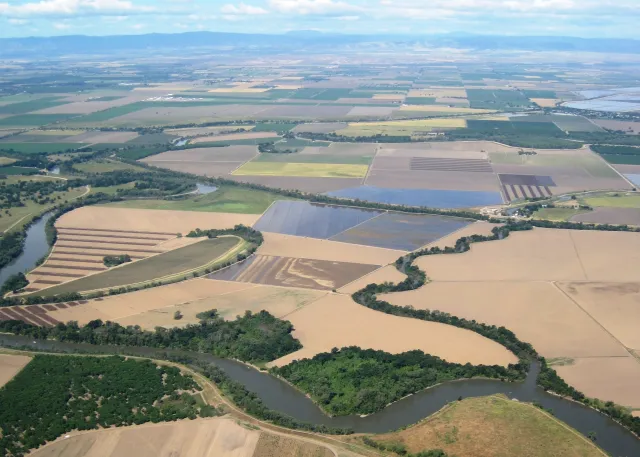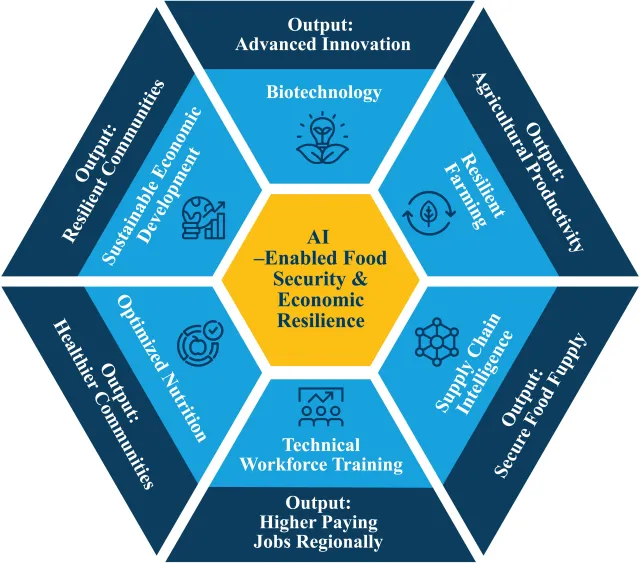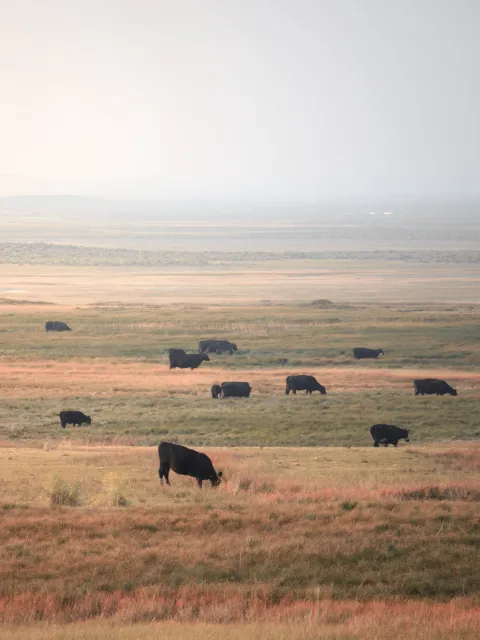Bold vision for tech-enabled food systems could help address $49.5B ag trade deficit, falling domestic production
A cross-state effort to modernize U.S. agriculture and strengthen domestic food security has advanced to the next phase of the National Science Foundation’s Regional Innovation Engines competition. The FutureFood Engine, led by University of California Agriculture and Natural Resources and backed by more than 50 partners across California and Nevada, has been selected as one of 29 semifinalists from nearly 300 initial applicants for a virtual site visit, the penultimate step in NSF's rigorous merit review process.
The Engine was conceived in response to growing pressure on the U.S. food system. Imports now supply roughly 15% of the nation’s food, contributing to a $49.5 billion agricultural trade deficit as of June 2025. Meanwhile, domestic fruit and vegetable production has declined by 10% and 23%, respectively, since 2000.

Growers in California and Nevada, who produce 75% of the country’s fruits and nuts, face mounting challenges, including water scarcity, extreme weather and persistent labor shortages. Many rural and tribal communities in the region also contend with poverty rates above 24% and limited access to modern infrastructure and capital.
“America’s food system is at an inflection point,” said Gabriel Youtsey, chief innovation officer at UC ANR and interim CEO of the FutureFood Engine. “By pairing advanced analytics and biotechnology with growers’ practical expertise, we can keep farms profitable, reinforce local supply chains and open new career paths in rural communities.”
“California and Nevada have long fed the nation, but climate extremes and economic pressures are eroding that leadership,” said Glenda Humiston, UC vice president for agriculture and natural resources. “This Engine gives us a practical pathway, rooted in science and community partnerships, to secure our food supply and revitalize the regions that grow it.”
The FutureFood Engine brings together a broad network of universities, growers, tribal governments, startups, economic development groups and community organizations to build a regional innovation ecosystem centered on food resilience.

AI infrastructure to support better decision-making in agriculture
At its core is FOOD-AI, a shared digital infrastructure that integrates data from farms, labs, markets and supply chains to support smarter decision-making, automation and sustainability across the specialty crop sector.
“FOOD-AI will translate decades of university research into easy-to-use digital tools,” said Ilias Tagkopoulos, chief technology officer of the FutureFood Engine and professor of computer science at UC Davis. “From climate-resilient breeding models and real-time water-use analytics, to AI-driven food processing platforms, our goal is to make cutting-edge science accessible on every farm and food facility, from farm to fork.”
“Water scarcity is one of the most urgent challenges facing agriculture in the West,” said Philippe Vidon, executive director of Earth & Ecosystems Sciences at the Desert Research Institute. “The Engine gives us a framework to apply advanced environmental data and computing power directly to farm and land management decisions, supporting more sustainable, adaptive food systems across the region.”

Over the next decade, the Engine aims to develop and deploy more than 30 AI- and biotech-enabled tools, launch or scale 50 agrifood startups, mobilize over $200 million in private investment, and train 10,000 workers in advanced food and agriculture technologies.
The work will be grounded in eight regional demonstration hubs and supported by education programs, community listening sessions and annual convenings such as the FEAST summit – the Engine’s annual summit for aligning partners, sharing progress and shaping future priorities.
“Tribal communities are stewards of some of the most climate-sensitive lands in the region,” said Daphne Emm Hooper, director of Indigenous relations at the University of Nevada Reno. “This initiative ensures they have a seat at the table, and the resources to shape resilient food systems that honor cultural values and support economic opportunity.”
This initiative is supported by a diverse group of partners across the public, private and nonprofit sectors, including the University of California Davis, Desert Research Institute, Nevada Governor’s Office of Economic Development, Western Growers Association, California Department of Food and Agriculture, Valley Vision, Central Valley Community Foundation, California League of Food Producers, Google, General Mills, fieldTRUE, and tribal governments throughout Northern California and Nevada.
During the “virtual site visit” stage of NSF's merit review process, panels of external experts will assess the Engine's regional coalition, leadership alignment and vision for transformative impact. Following the virtual assessment, selected teams will advance to in-person site visits before final funding decisions are announced in early 2026.

